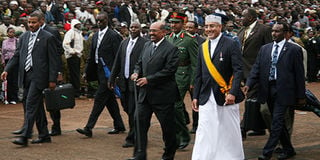EU Parliament plans Kenya censure over Bashir

Sudan President Omar al-Bashir arrives at Uhuru Park, Nairobi, for the promulgation ceremony of the new Constitution August 27, 2010. President al-Bashir is wanted by the International Criminal Court at The Hague over war crimes and genocide in his country’s Darfur. FILE
European countries plan to dress down the Kenya Government over its failure to arrest Sudan President Omar al-Bashir during the European Union/African Union Summit to be held in Libya at the end of November.
The European Parliament meeting in Strasbourg, France on Thursday heavily censured Kenya for failing to arrest the Sudanese leader, who has been indicted by the International Criminal Court (ICC) for alleged war crimes when he visited the country to attend the ceremony to promulgate the new constitution last month.
The MPs directed its representative to the joint EU/AU Summit to ensure that al-Bashir’s visit to Kenya tops the agenda at the Tripoli Summit.
“Parliament expresses its regret at Kenya's decision to invite President Omar al-Bashir to attend the signing of the new Constitution on 27 August, since Mr al-Bashir has been the subject of an arrest warrant from the International Criminal Court (ICC) since March 2009 for crimes against humanity and war crimes,” read a statement on the EU Parliament’s website.
“MEPs deplore the positions of the African Union and the Arab League, which are refusing to cooperate with the ICC,” the statement went on.
“The 31 African countries that have ratified the Rome Statute, including Kenya, are obliged to arrest any person who is wanted by the ICC and to deliver them to the Court or deny the person admission to their territory,” the MPs noted.
Already, ICC has moved to report Kenya to the UN Security Council over President Bashir’s visit so that appropriate steps might be taken.
A statement released by ICC hours after President al-Bashir made the surprise visit to Kenya read: “The court informs the Security Council of the United Nations and the Assembly of States Parties to the Rome Statute about Omar Al-Bashir's presence on the territory of the Republic of Kenya, in order for them to take any measure they may deem appropriate."
"The Republic of Kenya has a clear obligation to cooperate with the Court in relation to the enforcement of such warrants of arrest, it added."
The Security Council is yet to respond to a previous ICC notification that Sudan itself was not co-operating with the court. It's not clear it will do so now and reprimand Kenya for ignoring the arrest warrant.
Kenyan ambassadors in Europe were also summoned by their host nations to explain why the government did not arrest the Sudanese leader.
The ambassadors were summoned to foreign ministries in a number of European countries.
Kenya is a signatory to the International Criminal Court (ICC) and is obligated by its warrants.
"They emphasised that the UK expects the Government of Kenya to stand by its obligations under the Rome Statute, and as a UN member state," a statement from the British High Commission in Nairobi said.
Kenya, on its part, also went on a diplomatic offensive with Foreign Affairs minister Moses Wetangula summoning Western envoys based in Nairobi to explain reasons why the government had invited al-Bashir.
Kenya maintains that its decision to invite the Sudanese leader and Southern Sudan president Salva Kiir to the ceremony was in furtherance of its commitment to ensure the full implementation of the Comprehensive Peace Agreement (CPA) between North and South which is expected to culminate in the January referendum to enable Southerners decide whether to secede or not.
ICC accuses Sudanese President Omar el Bashir of war crimes and genocide but he has denied involvement.
ICC chief prosecutor Luis Moreno-Ocampo indicted President Bashir for allegedly committing the crimes in the Darfur region.
On 6 July, 2009, the Prosecutor filed an appeal against this decision. The Appeals Chamber granted the Sudan Workers Trade Unions Federation and the Sudan International Defence Group leave to make submissions as amicus curiae. Eight victims were also authorised to present submissions to the Appeals Chamber.
The situation in Darfur was referred to the International Criminal Court by the United Nations Security Council’s resolution 1593, on 31 March, 2005.
Three days after President al-Bashir visited Kenya, Khartoum summoned the EU ambassador to protest against EU’s statement criticising Kenya for hosting its leader.
The African Union has told its member states not to cooperate with the warrant. ICC judges reported Kenya, which is a member of the court, to the UN Security Council because Kenya did not arrest Bashir who attended the signing of the new Kenyan constitution.
Sudan's Foreign Ministry said a statement by the EU's high representative for foreign affairs, Catherine Ashton, raising concern at Bashir's Kenya visit was "totally unacceptable".
"The Ministry of Foreign Affairs called on the EU to end its double standards of giving immunity from legal proceedings to certain nationalities while targeting African countries alone," state news agency SUNA said.




